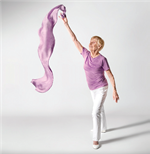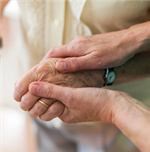While the initial shock of the pandemic may be behind us, we continue to navigate through a ‘new normal’ - a life that is very different for everyone, particularly for older adults.
As it is, social isolation and access to safe and efficient care are significant concerns for those living in long-term care, retirement residences and alone at home. Physical distancing measures have taken an additional toll and, in turn, there is a greater need to support the older adults in our lives. The importance of keeping older adults safe, engaged and connected has led to a wide range of novel collaborations and high-impact innovations.
“In order to keep our older adult population healthy, it is not enough for them to see a physician regularly. They need to be engaged and feel connected to their family and friends.”
When the World Health Organization (WHO) announced COVID-19 as a global pandemic, the Baycrest Telemedicine Rapid Implementation (TRIM) team was launched as a response. TRIM, co-led by Ron Riesenbach, VP Innovation and Chief Technology Officer, and Dr. David Conn, VP of Education, gathered experts from across Baycrest and beyond to explore and collaborate on methods to share Baycrest’s expertise virtually. With the pandemic growing and no time to lose, the TRIM team organized themselves into task forces and got to work developing and deploying solutions that would enable client care, recreational programming, and social engagement to continue even as visiting restrictions came into place and in person programs and services had to be cancelled. Among the solutions developed were low-cost telemedicine carts, dubbed “tCarts”. Comprised of iPads, special poles on wheels, webcams, speakerphones, digital stethoscopes and more, these tCarts enabled healthcare providers to access and assess patients and residents anywhere, anytime.
According to Dr. Adriana Shnall, Program Director, Clinical Programs, Baycrest@Home, social isolation among older adults is a serious public health concern. “In order to keep our older adult population healthy, it is not enough for them to see a physician regularly. They need to be engaged and feel connected to their family and friends.” To reduce the risks, an eVisit program was created to virtualize visits with family and friends using telephone and videoconferencing technology. From birthdays to weddings, older adults were empowered to continue to be a part of major milestones.
In addition to the eVisit program, a wide range of experts and creatives came together to keep older adults healthy, active and engaged, both on the Baycrest campus and beyond.
NATIONAL BALLET SCHOOL AND THE TORONTO SYMPHONY ORCHESTRA
Partners such as the National Ballet School and the Toronto Symphony Orchestra joined Baycrest’s mission to virtualize recreation that would empower older adults to explore and engage in the programming and activities they love. From singalongs to dance classes, older adults are able to choose from a variety of virtual activities to keep their minds and bodies active, while putting smiles on their faces.
INNOVATIVE PROGRAMMING
The cancellation of all large group activities on campus left a noticeable gap in the lives of Baycrest residents and patients accustomed to regular, in-person social engagement and recreational programming. A diverse range of innovative, digital programming has been developed to fill this void.
ART
Research shows that artistic creativity promotes brain health, increases feelings of confidence and self-esteem and enriches relationships. One initiative launched at Baycrest is a series with Ian Leventhal, acclaimed artist and Baycrest Foundation staff member, who leads virtual art classes.
COOKING
With many more individuals spending time in their kitchens these days, the popularity of online cooking classes has surged. The same is true at Baycrest, where Red Seal certified Baycrest Chef Derek Martens has hosted two virtual cooking demonstrations for patients, residents and donors.
PET THERAPY
Pet therapy has long been touted as valuable programming for older adults, helping to lessen the effects of anxiety, decrease risks of depression, and reduce feelings of loneliness. Due to physical distancing measures, Baycrest’s volunteer department has helped launch a virtual pet therapy program through FaceTime.
BEYOND OUR CAMPUS
Baycrest is helping older adults in the community as part of the North Toronto and North York Ontario Health Teams (OHTs). Over the past several months, Baycrest has led a COVID-19 Community Response team that has established clinical spaces in a number of Toronto Community Housing buildings to support their Senior Housing Unit, which houses close to 16,000 seniors across the city.
The team is working to redeploy specialized geriatric services and primary care physicians to tenants, provide primary health care services, support social distancing practices and infection prevention and control among older adults while mitigating unnecessary emergency department visits in North Toronto. Other solutions being supported include virtual care capabilities for tenants who may not have access or aptitude with digital devices but can still interact with health professionals. The team is optimistic that these efforts will help “flatten the curve”, narrow the digital divide afflicting many older adults in the community, and provide much-needed support to our health care system.
To find out more, subscribe to our email list for news and information about free webinars and expert resources. Visit baycrest.org/signup